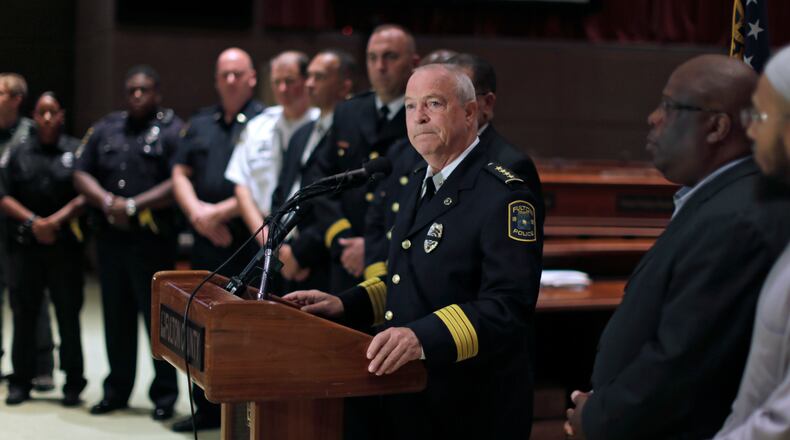A first step toward improving police interactions with the mentally ill might come with a survey.
Fulton County Police Chief Gary Stiles wants the county and city police departments to start tracking the difference between what people report when they call 911 and what the actual issues are. He plans to survey police departments in Fulton County’s cities to find out if they track how many calls they get about intoxication, for example, that are really mental health problems.
With that information, he hopes to one day create a team whose job is to de-escalate calls that involve the mentally ill.
By identifying what the actual issues are that people call the police for — not just what people perceive them to be — Stiles said he hopes to better help officers decide when they should engage and when they should back down.
“We don’t want to hurt anybody, but our officers also want to go home,” Stiles said. “If we can prevent one tragic incident, then it’s worth it.”
Stiles told area mayors at a meeting Wednesday that he would be in touch with their police chiefs with a survey requesting information. College Park Mayor Jack Longino said there was “no question” there was a need for better crisis intervention, while Sandy Springs Mayor Rusty Paul said his city will do whatever is needed to help with the process.
“There’s more we can do together to prevent the tragedies we’ve seen way too often,” he said. “It’s worth it.”
Stiles does not have a timeframe for his proposal, but said that he would eventually like to see crisis intervention teams that consists of mental health professionals and plainclothes officers. He likened the teams to a bomb squad or a SWAT team that are called in for special duties that street officers would not be expected to perform.
But the first step, he said, is gathering information.
“One of the problems of law enforcement is not knowing what we don’t know,” Stiles said.
With luck, the creation of such teams would decrease the likelihood of a preventable fatal shooting in Fulton County, Stiles said. It would also create a consistent, regional response to mental health calls from the unincorporated area and the county’s 14 cities. Crisis intervention teams could be called in to de-escalate those who were intoxicated as well as those who are mentally ill, he said.
The plan is part of a push by Fulton County Chairman John Eaves to change the way thecriminal justice system deals with mental health patients by diverting them before they enter the jail. Between 40 and 70 percent of those in the criminal justice system have some form of mental illness, he said.
“Jail should not become the default option for people who are mentally ill,” Eaves said.
Stiles said the 2015 death of Anthony Hill, a mentally ill Afghanistan veteran who was naked when he was shot by DeKalb County police outside his apartment complex, illustrates the kind of situation he is trying to avoid.
“There ought to be a better way to handle this one,” Stiles said. “My god, that was a disturbing thing.”
The county doesn't know how much it would cost to train for crisis intervention or create separate teams, but Eaves said doing such work could help keep Fulton County from tragic incidents — like in South Florida, where police shot an autistic man's caretaker this summer, or California, where a man was shot and killed this week after a relative called 911 and said he was mentally ill and not acting like himself.
“We are all one call away from that,” Stiles said.
Eaves said the county is “going to do something” to help prevent such incidents.
“To a certain degree, we’ve been lucky,” he said. “There are basic things being done now, but the reality is, it can happen anywhere. We just have to be ready.”
About the Author
Keep Reading
The Latest
Featured




